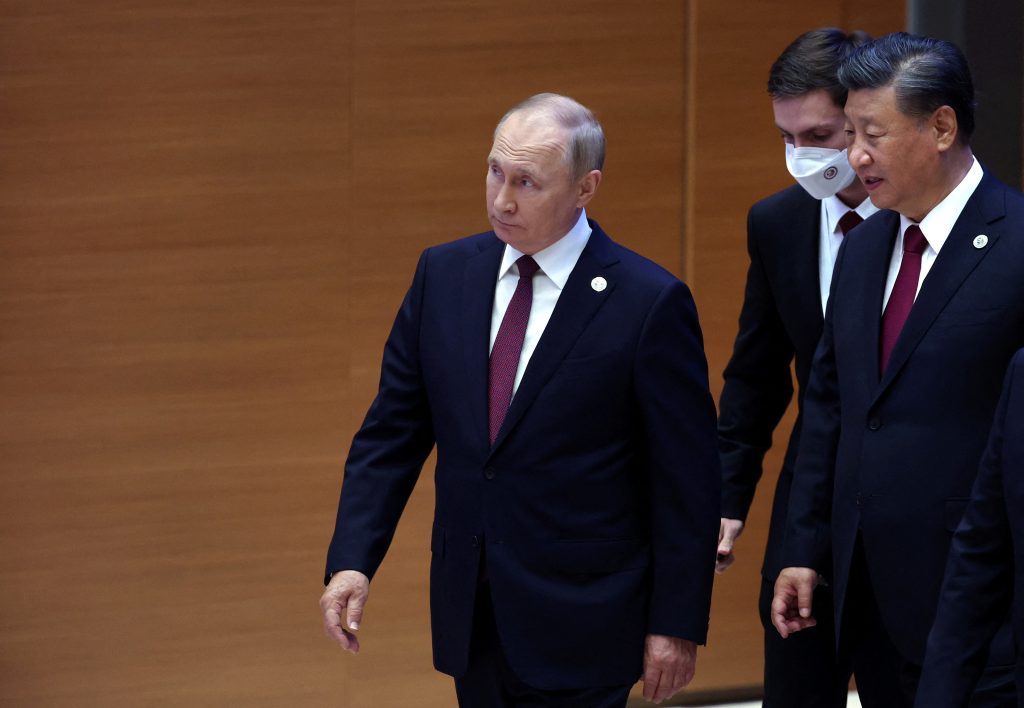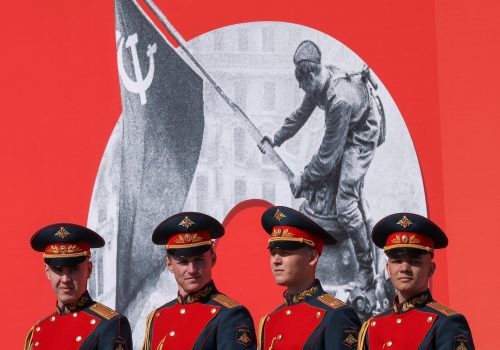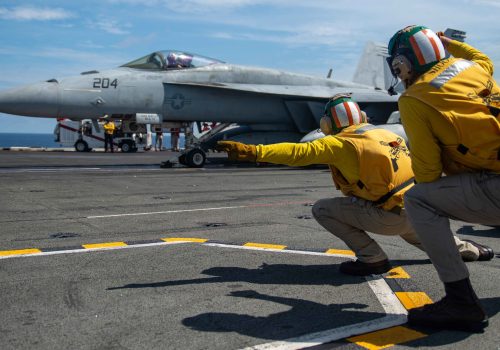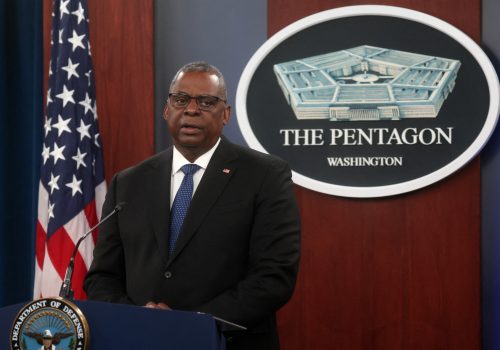In “Russia policy after the war: A new strategy of containment,” my Atlantic Council colleague and good friend Alexander (Sandy) Vershbow provides a primer for any administration. Vershbow’s credentials include having served as head of mission in Moscow and Seoul and as NATO’s deputy secretary general. And his recommendations are on the mark.
I have only one important addition to make to support his case to combine military means with powerful diplomatic, information, and other non-kinetic initiatives to take on Vladimir Putin frontally and force an end to the Ukraine conflict on terms acceptable to Kyiv. It concerns the meaning of containment.
The conventional definition and use of containment understandably refers to George Kennan’s famous 1946 “long telegram,” which was foundational to US and Western national security. But that definition no longer fits the world of 2023, a world that has profoundly changed over the past nearly eight decades. Russia’s invasion of Ukraine in 2022 and a more assertive China make that crystal clear.
In this world, to be effective, containment must be more muscular. That means shifting from largely defensive and reactive policies to more proactive and dynamic ones to deal with newer and emerging challenges, threats, and opportunities regarding Russia and China. How then can “muscularization” be accomplished? It starts with understanding that the original basis of containment was defensive and reactive.
As the Soviet Union extended its reach westward, Kennan, one of the shrewdest students of Russia and the Soviet Union, called for a policy of “containment” to limit the spread of Moscow’s influence and control. An early objective was to construct a network of defensive alliances to surround and hence contain Soviet expansion.
That led to the formation of NATO in 1949, followed by the short-lived Southeast Asia Treaty Organization and Central Treaty Organization and, later, bilateral defense treaties with Australia, Japan, South Korea, and the Philippines. Europe was fragmented and still recovering economically from the war. And Chiang Kai-shek and his Kuomintang had not yet lost control of China.
Today, Europe is whole, free, and prosperous. Until last year, Europe was at peace. One can argue that Russia today is far stronger than the Soviet Union was after World War II. Twenty million dead and a society destroyed by the Nazis was far worse than what today’s Russia faces. Economic sanctions and two hundred thousand casualties in Ukraine have taken their toll, but Russia still has thermonuclear weapons and massive energy reserves.
If the concept of containment is to be maintained, it needs to be revised for the twenty-first century and adapted to deal with China as well as Russia—especially given that, over the past decade or more, containment has not worked vis-à-vis either country.
Putin was neither contained nor deterred rolling into part of Georgia in 2008, Crimea and the Donbas in 2014, and the rest of Ukraine last year. Similarly, China’s Belt and Road Initiative, militarization of small islets, and stated plans for absorbing Taiwan have not been contained or deterred.
Because containment has been in place for so long, finding a replacement phrase probably is not a good idea. Thus, the better choice is to make containment more muscular. As Vershbow argues, it is the diplomatic, informational, and non-kinetic muscles that need strengthening in addition to the military instrument of power. He proposes to beef up NATO’s permanent presence on the eastern flank by suspending the NATO-Russia Founding Act, re-energize diplomacy, and commit unequivocally to Ukrainian victory.
One of the areas that also requires a different form of muscularity is defense. I have written previously about the need for a Porcupine Defense, in part demonstrated in Russia’s war in Ukraine, that would render any future attack by Moscow against Ukraine or any NATO ally so costly as to be infeasible. Similarly, in Asia, a Mobile Maritime Defense would confine China to the first island chain—which runs from the Korean peninsula through Taiwan and Indonesia to Vietnam—and make Taiwan virtually impregnable against a military invasion with a version of the Porcupine Defense.
Similarly, as Vershbow argues, more aggressive diplomacy to expand partnerships and reduce the influence of Russia and China are vital. This would also include intelligent influence operations, something in which the United States has not always excelled.
Vershbow makes a highly important contribution. A new and more muscular strategy towards Russia and China is needed. Indeed, while the current Sino-Russian “friendship without limits” may be overstated in significance, it must be more closely analyzed in keeping with the need for a strategic debate over which actions the United States and its allies should take next. And if that strategy is to embrace the concept of containment, then creating a version fit for purpose today—and not just what Kennan had in mind in 1946—is essential to success.
Harlan Ullman is an Atlantic Council senior advisor and UPI’s Arnaud deBorchgrave distinguished columnist. His latest book is The Fifth Horseman and the New MAD—How Massive Attacks of Disruption Became the Looming Existential Danger to a Divided Nation and the World at Large. He can be found on Twitter @harlankullman.
Further reading
Wed, Feb 22, 2023
Russia policy after the war: A new strategy of containment
New Atlanticist By Alexander Vershbow
To prevent further damage to the rules-based international order, the United States and its allies will need a strategy of containment to deter Russia militarily and decouple Russia from the international community, until Moscow has earned the right to be considered a partner once more.
Fri, Feb 3, 2023
Is the US over-militarizing its China strategy?
New Atlanticist By Harlan Ullman
China lacks the capability to seize and occupy Taiwan with an amphibious invasion, but the US spends inordinate time and money preparing for one. It's time to rethink the strategy.
Thu, Oct 27, 2022
Eight things you need to know about the new US National Defense Strategy
New Atlanticist By
Does the strategy succeed? We turned to our experts to break down the Pentagon's plans.
Image: Russian President Vladimir Putin speaks with Chinese President Xi Jinping before an extended-format meeting of heads of the Shanghai Cooperation Organization summit (SCO) member states in Samarkand, Uzbekistan September 16, 2022. Sputnik/Sergey Bobylev/Pool via REUTERS



